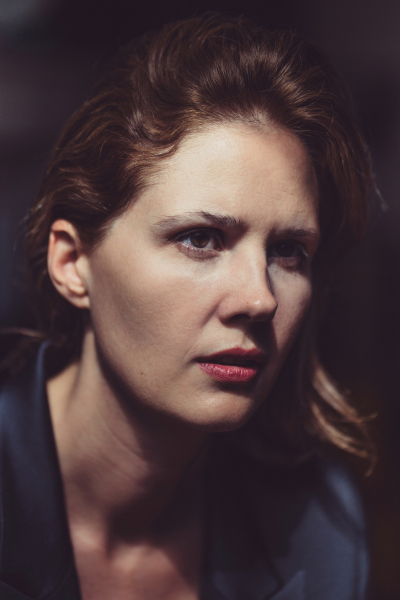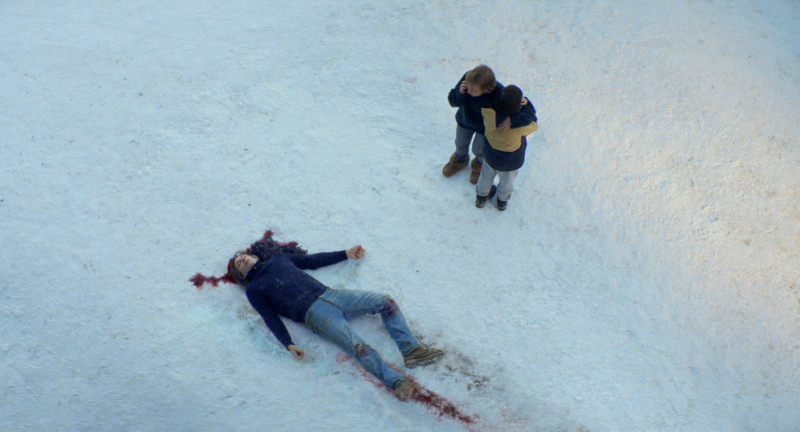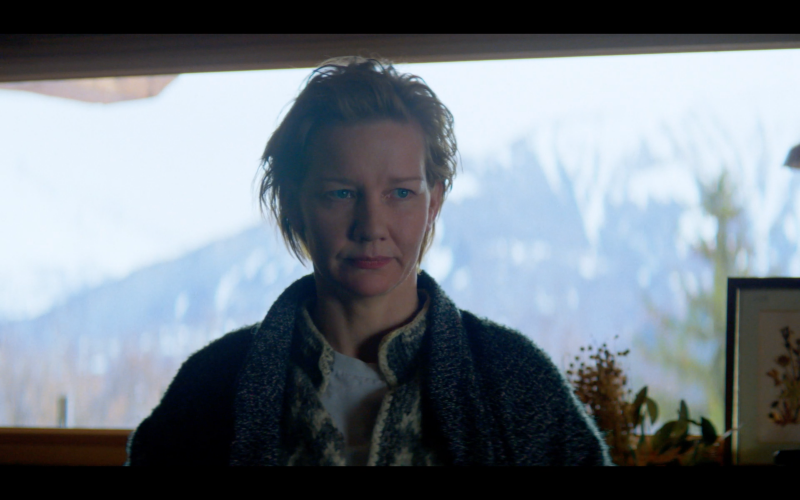
Every relationship is a secret between two people. Nowhere is this more evident than in French director Justine Triet’s acclaimed new film, Anatomy of a Fall, a gripping and slippery courtroom psychodrama that attempts a forensic analysis of a marriage to discern whether a successful novelist murdered her frustrated writer husband. (The film’s website is, accordingly, didshedoit.com.)
Set in the wintry, remote French Alps, the film makes detectives of its audience, proffering evidence in the form of transcripts, surreptitious audio recordings, splatter analysis, literary criticism, therapist testimony, reenactments involving stuffed dummies, and flashbacks that may not be entirely accurate. Adding sometimes dubious insight into the couple’s relationship are their sight-impaired 11-year-old son and the family’s adorable pup, named – bien sûr – Snoop.
This year Triet, 45, became only the third woman filmmaker to win the Cannes Film Festival’s top prize, after Jane Campion (1993’s The Piano) and Julia Ducournau (2021’s Titane). Accepting the Palme d’Or, Triet courted controversy with an impassioned speech criticising the French government for cracking down on the pension-reform protests (which had rocked the country for months at that point) and tightening its grip on society at large, including the nation’s legendary film industry. And just weeks ago she expressed her displeasure on social media about her film being snubbed as France’s official selection for the Best International Feature Oscar, with some speculating the move was retribution for her Cannes speech.
Such outspokenness is unusual from a director of such a high-profile, awards-positioned movie. “It’s important to be loyal to what you have to say,” Triet says simply, red hair tucked under a baseball cap, in a recent interview alongside a translator. “You might not be liked by all, but you’ll be liked a lot by some.”

Anatomy of a Fall has won over critics since its Cannes debut by, like Saint Omer earlier this year, depicting the French courtroom as a site of unbridled drama where the balance can tip as much to fiction as truth. Lawyers, witnesses and the defendant interject and insinuate more freely than in American or British courts, producing a lively parry that, remarkably, is mostly accurate to the country’s real-life trials, according to Triet, who consulted a criminal lawyer on the details.
Indeed art cast from real life is a recurrent theme in the film, and the resentments that can arise between a couple negotiating time for creative work and home responsibilities erupt in one captivating key scene. “It’s a very contemporary question that so many people and so many women around me face,” says Triet of the often fraught issue. “It also asks deeper philosophical and historical questions about what happens when we feel like another person can steal our time, can steal our life. These kinds of questions of appropriation and theft are interesting to me.”
And gender, of course, greatly tips that struggle for balance. “For centuries, women have been assumed to be naturally fit for a specific kind of role,” she observes. “The question of time seems to be the very central element of that emancipation.”
Anatomy’s enigmatic protagonist, Sandra, is portrayed by the formidable German actor Sandra Hüller (best known for 2019’s Toni Erdmann), already crowned actor of the year with lead roles in two of the most acclaimed films on this year’s festival circuit. (She also stars in Jonathan Glazer’s hotly debated Holocaust drama The Zone of Interest.)
Triet wrote the role for Hüller after they worked together on the director’s last film, 2019’s Sibyl, drawn to the actor’s authenticity and ability to “perform with her soul”. “She is human, but she’s not saying, ‘Love me,’” Triet says of Hüller’s appeal at this moment. “She doesn’t care about that. And she’s like this in real life: she has a very full life in German theatre and is happy to play in movies, but she’s not preoccupied with [movies].” (Another stellar casting choice: the black-and-white border collie who plays Snoop took home this year’s Palm Dog award. “He’s not just an accessory,” the director stresses. “He cannot speak, but he sees everything.”)

In a year with no shortage of women protagonists who only grow more opaque as their films progress (see the forthcoming May December from Todd Haynes and Catherine Breillat’s Last Summer), Triet and Hüller have crafted the rare character who unapologetically prioritises her career, flouts norms around sexuality and monogamy, and does the minimum of her share of parenting – that is, the rare female character. “One of the very original things Sandra, the character and the actor, does is not play any kind of seduction game to claim what she wants,” Triet notes.
Sandra is also a fiction writer who borrows liberally from life experience, which the prosecution claims makes her an expert manipulator in court. “She appropriates reality through her writing, and her mastery over narrative and fiction and language all coalesces to make her seem like a threat in the tribunal,” Triet explains. “I was very interested in how, during the trial, all the things that constitute her as a person and a woman, her power and strength, become what she’s scrutinised for.”
But the filmmaker warns not to read too much into the film about her own life – even though she wrote it with her partner, Arthur Harari, with whom she wrote Sibyl and shares two children. “I put everything at a distance in the writing because I don’t think my life is interesting enough to be told in this way,” she says. “I do work from things that move me and are in my vicinity but always by extrapolating them in much more passionate and grandiose ways.” (She’s indicated that she and Harari likely won’t be collaborating again.)
Yet to create such a layered portrait of a headstrong, sometimes difficult, ultimately unknowable woman, Triet concedes that she may have, like Sandra, drawn from her own experiences. “Because I’m a woman,” she suggests, “it may be that the sorts of questions and characters I’m interested in depicting lean toward the questions I ask myself about what it means to exist in the world and be in one’s own power.”
But the question of why so few women have won the Palme d’Or, one of cinema’s most prestigious prizes, remains to Triet a mystery; the image of Jane Campion surrounded on the red carpet by fellow past winners (all male) at the 2017 festival often flashes in her mind. Yet being categorised as merely a woman filmmaker sits uncomfortably. “With women being more than half the population, it’s an injustice to be seen as speaking from a circumscribed perspective when it’s really a population-wide position,” Triet reflects. “What would it mean to exceed the position of womanhood and be a witness for humanity at large?”



